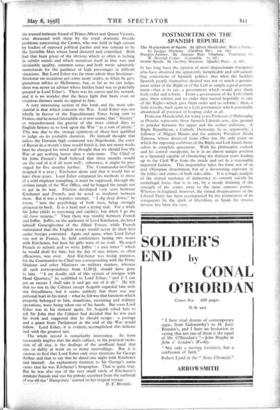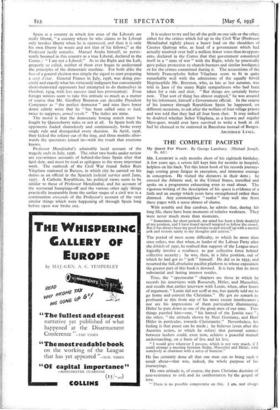POSTMORTEM ON THE SPANISH REPUBLIC
Inside Spain. By Geoffrey Brereton. (Quality Press. 3s. 6d.)
IT has long been the opinion of most dispassionate foreigners who have observed the apparently inexplicable and self-cancel- ling contortions of Spanish politics that what the luckless Spanish people themselves desired was not so much a govern-
ment either of the Right or of the Left as simply a good govern- ment—that is to say, a government which would give them both order and reform. From a government of the Left which gave them reform and no order they turned hopefully to one of the Right—which gave them order and no reform ; then, a little wearily, back again to a Left government which practically abandoned all pretence of keeping order at all.
Professor Mendizabal, for many years Professor of Philosophy at Oviedo, represents those Spanish Liberals now, alas, ground to powder between the upper and the nether millstone. A Right Republican, a Catholic Democrat, he is, apparently, a follower of Miguel Maura and the unlucky President Alcala Zamora, whose dismissal from office was the only point on which the opposing coalitions of the Right and Left found them- selves in complete agreement. With his philosophic outlook and his central standpoint, he is in an almost unique position as a Spaniard capable of chronicling the thirteen years leading up to the Civil War from the inside and yet in a reasonably impartial fashion. This impartiality takes the form not of an arid Olympian detachment, but of a devastating exposure of the follies and crimes of both sides alike. It is a tragic analysis of the eternal tendency of democracy to commit suicide by centrifugal force, that is to say, by a steady draining of the strength of the centre away to the more extreme parties. Whereas in England, however, the virtual disappearance of the Liberal Party has been accompanied by the permeation of its conquerors by the spirit of liberalism, in Spain the precise reverse has been the case.
Spain is a country in which few even of the Liberals are really liberal, "a country where he who claims to be Liberal only invokes liberty when he is oppressed, and then it is only his own liberty he wants and not that of his fellows," as the Professor justly remarks. Manuel Azafia himself, so persis• tently boomed in this country as a true Liberal, declared in the Cortes : "I am not a Liberal." As to the Right and the Left, properly so called, neither of them ever began to understand the principles of the democratic machine. For both alike the loss of a general election was simply the signal to start preparing a coup d'etat. General Franco in July, 1936, was doing pre- cisely and exactly what his virtuously indignant but conveniently short-memoried opponents had attempted to do themselves in October, 1934, with less success (and less provocation). Even foreign writers seem to take this attitude so much as a matter of course that Mr. Geoffrey Brereton can describe President Companys as "the perfect democrat" and nine lines lower down calmly write that he "has been called once to lead, twice to suppress; armed revolt." The italics are mine.
The moral is that the democratic boxing match must be fought by Queensberry rules or not at all. In Spain both the opponents fouled shamelessly and continuously, broke every single rule and disregarded every decision. In April, 1936, they kicked the referee out of the ring, and three months after- wards the spectators joined in—with the result that everyone knows.
Professor Mendizabal's admirably lucid account of the tragedy ends in July, 1936. The other two books under review are eye-witness accounts of behind-the-lines Spain after that fatal date, and must be read as epilogues to the more important work. The outbreak of the Civil War found Seftor Ruiz Vilaplana stationed in Burgos, in which city he carried on his duties as an official in the Spanish judicial service until June, 1937. A Catholic Republican, his political views seem to be similar to those of Professor Mendizabal, and his account of the nocturnal bumpings-off and the various other ugly things practically inseparable from the earlier stages of a civil war is a continuation crescendo of the Professor's account of the very similar things which were happening all through Spain long before open war broke out.
It is useless to try and lay all the guilt on one side or the other, either for the crimes which led up to the Civil War (Professor Mendizabal rightly places a heavy load on the shoulders of Casares Quiroga who, as head of a government which had actually received over half a million fewer votes than its oppon- ents, declared in the Cortes that that government considered itself in a "state of war" with the Right, while he practically gave police protection to church-burners and similar hooligans) or for the crimes committed during it. The accusations of the bitterly Francophobe Senor Vilaplana seem to fit in quite remarkably well with the admissions of the equally fervid Negrinophile Mr. Brereton, who, as late as last autumn, was told in Jaen of the many Right sympathisers who had been taken for a ride and shot. "But things are certainly better now. That sort of thing has almost stopped," he was assured by his informant, himself a Government official. In the course of his journey through Republican Spain he happened, on different occasions, to ask after the welfare of four village priests and was told that they had all four been shot. It may indeed be doubted whether Senor Vilaplana, as a known and regular Mass-goer, would ever have survived to write a book at all had he chanced to be stationed in Barcelona instead of Burgos.
ARCHIBALD LYALL.



































































 Previous page
Previous page